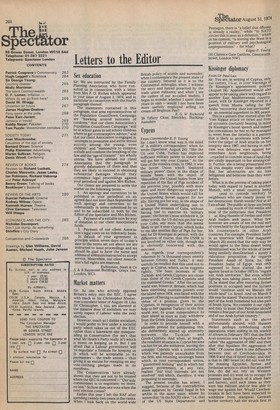Cyprus
From Commander E. P. Young
Sir: I don't know what was in the mind of 'A military correspondent' when he wrote (Spectator, August 24): "like the US over Cuba, Turkey has deployed Sufficient military power to insure she will get her way over Cyprus." At the time of the missiles crisis, in 1962, it was the Soviet Union which 'deployed military power' there, in the shape of missile bases, with the object of 'dissuading' the United States from any repetition of the Bay of Pigs incident of the previous year, possibly with more open and more dangerous support by the United States which would call for corresponding Soviet support for her ally. Having got her way, in the shape of a United States undertaking not, to attempt the invasion of Cuba, without having had to exercise its 'military power,' the Soviet Union withdrew it. In other words, the US did not get her way over Cuba, any more than she seems likely to get it over Cyprus, which looks to me like another Bay of Pigs for her, and for Dr Kissinger in person, with the difference, of course, that the USSR is not involved on either side, though she is obviously concerned with the outcome.
As regards your correspondent's reference to "a thousand-years enmity between Greeks and Turks," it may usefully be recalled that this used not to apply in Cyprus, where, as he suggests rightly, "the basic interests of the Turkishand Greek-Cypriots are closer than those of the Greek-Cypriots and the mainland Greeks." After the second world war, however, Britain, which had been exercising suzerain powers over the island since 1878, was faced with the prospect of having to surrender these by virtue of a promise given to the Cypriots, in recognition of their active help to her (against Turkey) in the first world, war, to grant independence to their island as soon as Italy withdrew from the Greek Dodecanese islands.
In order to provide herself with a plausible pretext for poStponing this, she deliberately stirred up animosity between the Turkishand Greek-Cypriots. And when, at length, the resultant situation in Cyprus became too hot for us, she withdrew, leaving the unhappy Cypriots with a constitution which was patently unworkable from the first, and retaining sovereign bases which, as your correspondent writes, "guaranteed nothing" and in which her present government, at any rate, realises "our vital, interests are not involved" and which, therefore, it was proposing to surrender. The present trouble has arisen, I suggest, because of the contradiction made apparent by Gerald Segal in his ardUe in the same issue, where he writes that "in the NATO view," i.e. that of the US State Department and
Pentagon, there is "a belief that detente is already a reality," while "in NATO :circles this is seen as a delusion," which (in his opinion, "is leaving the West in a iposition of military and psychological
iun_preparedness" — for what? a
Edgar P. Young
101 Clarence Gate Gardens. Glentworth Street, London NW!


































 Previous page
Previous page